Have we ever made excuses for missing Sunday Mass? Here are two of the worst excuses I’ve ever heard, and they are my favourite: 1) Someone once mentioned to me, “I haven’t been to Mass for the past two weeks.” I asked, “Why’s that?” “We were on vacation and couldn’t find a church.” “Oh… Where were you?” “Italy.” 2) One of our teachers in New York told us that he once met a man at a dinner, who said, “Father, I haven’t been to Mass since some war, because, one time, when we were having Mass in the fields, enemy planes started flying overhead, and the priest shouted, ‘Run for cover! You’re all dispensed from Mass!’ and I haven’t been back since.” What?! The priest dispenses you from Mass because there’s an air raid and you think that dispensation lasts for the rest of your life?
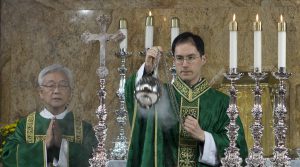 We’ve mentioned a number of times now that Sunday Mass is a serious moral obligation for us Catholics, mainly because of the importance, beauty, and graces of the Eucharist. Today we want to give another strong reason why Mass is life-giving and all-important. However, I don’t want anyone here to feel excessively guilty, rather, if we’ve made excuses in the past, I hope that we own them and just peacefully go to Confession. (Healthy guilt is good when we sin, but not an excessive guilt.)
We’ve mentioned a number of times now that Sunday Mass is a serious moral obligation for us Catholics, mainly because of the importance, beauty, and graces of the Eucharist. Today we want to give another strong reason why Mass is life-giving and all-important. However, I don’t want anyone here to feel excessively guilty, rather, if we’ve made excuses in the past, I hope that we own them and just peacefully go to Confession. (Healthy guilt is good when we sin, but not an excessive guilt.)
If you’re a guest here today, it’s great you’re with us because we’re going to encounter Jesus’ gift! I hope this message helps you, and pray it doesn’t overwhelm you. At this parish, the Eucharist is the centre of our lives, and we’ve spent years building up a love for the Mass. Consequently, this is something for which most people here are ready.
The Second Reading today, from the Letter to the Hebrews, is about Jesus’ sacrifice. It starts by saying, “Every priest stands day after day at his service, offering again and again the same sacrifices that can never take away sins” (Heb 10:11). This refers to the Old Testament, where priests would offer morning and evening sacrifices in order to take away sin. But, as we talked about two weeks ago, these sacrifices couldn’t .
The Old Testament sacrifices couldn’t take away sin, but Christ’s sacrifice can. The reading goes on to say, “Christ had offered for all time a single sacrifice for sins… For by a single offering he has perfected for all time those who are sanctified… Where there is forgiveness of sin and lawless deeds, there is no longer any offering for sin” (Heb 10:12,14,18). Nevertheless, there’s an apparent problem for us Catholics: It says there’s only one sacrifice, but we Catholics offer up Mass every day and say it’s a sacrifice. Many Protestants then fairly ask, “Why do you Catholics say your Mass is a sacrifice when the Bible says there’s only one sacrifice, that of Christ’s?”
There are three answers to this objection. First, the starting point: Jesus said during the Last Supper, “Do this in remembrance of me.” Do what? “Take this, all of you, and eat of it, for this is my Body, which will be given up for you.” All the early Christians believed Jesus’ command here referred to a sacrifice. Even a famous Protestant historian acknowledges this. And, during my trip to London, I met many wonderful Protestant and Evangelical pastors, one of whom said to me that, when St. Paul says, “Whoever… eats the bread or drinks the cup of the Lord in an unworthy manner will be guilty of profaning the body and blood of the Lord”(1 Cor 11:27), this can’t be a mere symbol, because, if it were, how could one profane Jesus’ Body? The point is, the Mass is more than a symbol!
Second, when the Jewish people celebrated the annual Passover meal, they believed they were brought back to that escape from Egypt, the original Passover.
Please look at this famous painting: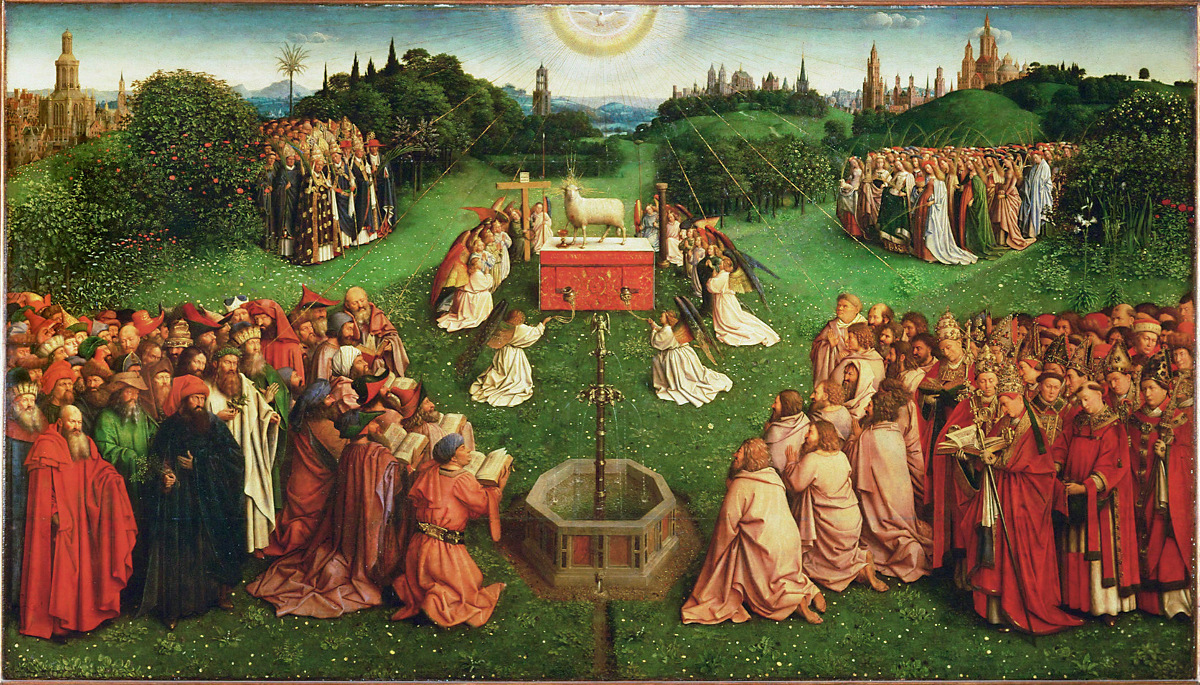
As we always do when we look at sacred art, we ask, “Where is the eye drawn? What’s the centre of the painting?” Very good, the altar, on top of which is a lamb; we know this because every person in the painting is looking at it. If we zoom in, we see that the Lamb is alive and alert but has its blood pouring out into a chalice. 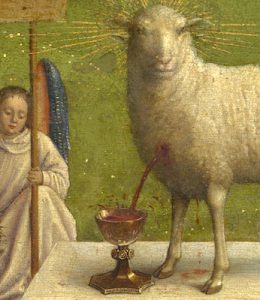 Why? Because in the Bible, in Revelation, John has a vision of heaven and sees Jesus as a Lamb (Rev 5:6), the “Lamb of God, who takes away the sin of the world” (Jn 1:29,36). This painting perfectly captures the truth that the Mass makes Jesus’ sacrifice on the Cross present again in our time, so that people of all time can go to that sacrifice and receive the benefits and graces it offers (Scott Hahn, Reasons to Believe, 120). Jesus’ sacrifice is like a spring of water which gushes out new life! Through the gift of the Mass, everyone can approach this fountain and drink from it.
Why? Because in the Bible, in Revelation, John has a vision of heaven and sees Jesus as a Lamb (Rev 5:6), the “Lamb of God, who takes away the sin of the world” (Jn 1:29,36). This painting perfectly captures the truth that the Mass makes Jesus’ sacrifice on the Cross present again in our time, so that people of all time can go to that sacrifice and receive the benefits and graces it offers (Scott Hahn, Reasons to Believe, 120). Jesus’ sacrifice is like a spring of water which gushes out new life! Through the gift of the Mass, everyone can approach this fountain and drink from it.
This leads to the third reason: If we look closely at one of the sentences we just read, which says, “For by a single offering he has perfected for all time those who are sanctified,” it actually should read, “For by a single offering he has perfected for all time those who are [being] sanctified” (Heb 10:14) (See here for Greek text.) Sanctification means being made holy, and being sanctified means it’s something ongoing, not a one-time event.
St. Augustine said that we’re all wounded people who have been saved by Baptism. Once spiritually alive again, we spend the rest of our lives in convalescence, meaning a period of recovery. That’s why we need to continue going back to Jesus’ cross, made present in the Mass, for strength and healing!
This is Servant of God Fr. Walter Ciszek. 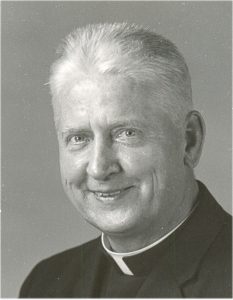 The title, Servant of God, is three levels below a saint. A holy person is first recognized as a servant of God, then venerable, then blessed, and then finally a saint. He was born in Pennsylvania in 1904 and answered the call of Pope Pius XI to go to Russia to serve secretly Christians being oppressed by the Communists. In 1941, he was arrested as a Vatican spy and sentenced to 15 years of hard labour in Siberia.
The title, Servant of God, is three levels below a saint. A holy person is first recognized as a servant of God, then venerable, then blessed, and then finally a saint. He was born in Pennsylvania in 1904 and answered the call of Pope Pius XI to go to Russia to serve secretly Christians being oppressed by the Communists. In 1941, he was arrested as a Vatican spy and sentenced to 15 years of hard labour in Siberia. 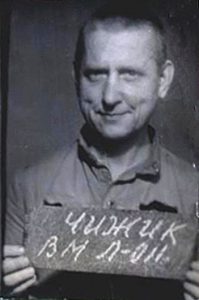 In prison, he and another priest would sometimes sit at the edge of their beds, pretending to read or talk while saying the Mass from memory, using a glass for the chalice and regular bread. After he was freed, he wrote, “In every camp, the priests and prisoners would go to great lengths, run risks willingly, just to have the consolation of this sacrament… Most often… we said our daily Mass somewhere at the work site during the noon break… Everyone observed a strict Eucharistic fast from the night before, passing up a chance for breakfast and working all morning on an empty stomach. Yet no one complained… There were no altars, candles, bells, flowers, music… yet in these primitive conditions, the Mass brought you closer to God than anyone might conceivably imagine… Just the thought of having celebrated Mass here, in this spot, made my journey to the Soviet Union and the sufferings I endured seem totally worthwhile… So I never let a day pass without saying Mass; it was my primary concern each new day” (Fr. Walter J. Ciszek, S.J., He Leadeth Me, 131-133).
In prison, he and another priest would sometimes sit at the edge of their beds, pretending to read or talk while saying the Mass from memory, using a glass for the chalice and regular bread. After he was freed, he wrote, “In every camp, the priests and prisoners would go to great lengths, run risks willingly, just to have the consolation of this sacrament… Most often… we said our daily Mass somewhere at the work site during the noon break… Everyone observed a strict Eucharistic fast from the night before, passing up a chance for breakfast and working all morning on an empty stomach. Yet no one complained… There were no altars, candles, bells, flowers, music… yet in these primitive conditions, the Mass brought you closer to God than anyone might conceivably imagine… Just the thought of having celebrated Mass here, in this spot, made my journey to the Soviet Union and the sufferings I endured seem totally worthwhile… So I never let a day pass without saying Mass; it was my primary concern each new day” (Fr. Walter J. Ciszek, S.J., He Leadeth Me, 131-133).
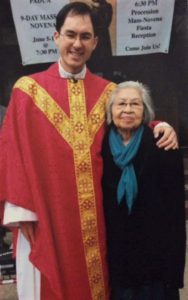
 Does anyone remember seeing this woman, Marcelina Basiga? She would never miss Mass, even though it took her 10 minutes with her walker to walk from her apartment just around the corner, and 25 minutes to walk in the snow; she never missed even then. She understood what Fr. Ciszek understood. And there are so many of you who never miss Mass, even though it’s hard. Here are just a few: Chris and Bev, who were here a day after giving birth; Jeannette, who comes alone with her two children under the age of three; the Uys with their ten children; Janna and Kim, who sometimes work the night shift at the hospital then come for the 8:15 a.m. Mass. I want to thank all of you for being faithful to the Lord, and it’s inspiring, considering that for some of you, it’s really hard.
Does anyone remember seeing this woman, Marcelina Basiga? She would never miss Mass, even though it took her 10 minutes with her walker to walk from her apartment just around the corner, and 25 minutes to walk in the snow; she never missed even then. She understood what Fr. Ciszek understood. And there are so many of you who never miss Mass, even though it’s hard. Here are just a few: Chris and Bev, who were here a day after giving birth; Jeannette, who comes alone with her two children under the age of three; the Uys with their ten children; Janna and Kim, who sometimes work the night shift at the hospital then come for the 8:15 a.m. Mass. I want to thank all of you for being faithful to the Lord, and it’s inspiring, considering that for some of you, it’s really hard.
Today, Jesus is reminding us of the wonder of the Mass! For those of us who struggle to come to Mass every Sunday, now is the time to make that commitment to Jesus, who’s made a covenant with us. It’s a mortal sin if we miss Mass through our own fault, so, if we’re physically unable to make it, it’s not a sin (E.g. We’re in the hospital or are so sick that we can’t leave home), but we must make the effort to glorify God, to go to Mass anywhere in Vancouver. There’s a Mass Finder on the Archdiocese of Vancouver website. And whenever we’re away on vacation or travelling, we just have to google “Catholic churches” and check their Mass times.
For those of us who are already committed, could we make that effort, not out of obligation but out of love, to come to some daily Masses more regularly? And for those of us who come to daily Masses but are inconsistent, is now the time to commit never to missing Mass?
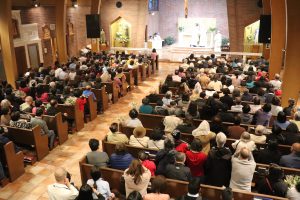 I dream of a time when our daily Masses will be packed with people, 9:00 a.m. Mass on Saturday being full, the 8:15 a.m. Masses filled with students, teachers, and parents from our school, and the 7:30 p.m. Tuesday Mass overflowing. Let’s pray today for grace to hunger for the Mass. One of the longest waits for me is the time between Monday morning Mass and Tuesday evening Mass—I actually feel it’s been a long time since I participated in the Mass.
I dream of a time when our daily Masses will be packed with people, 9:00 a.m. Mass on Saturday being full, the 8:15 a.m. Masses filled with students, teachers, and parents from our school, and the 7:30 p.m. Tuesday Mass overflowing. Let’s pray today for grace to hunger for the Mass. One of the longest waits for me is the time between Monday morning Mass and Tuesday evening Mass—I actually feel it’s been a long time since I participated in the Mass.
St. Augustine says in every sacrifice four things should be considered: who’s offering, what’s being offered, to whom we’re offering, and for whom we’re offering. So, when some people say, “I don’t need to go to Mass. I pray at home,” I reply, “Who’s doing the offering? You. What are you offering? I have no idea. And for whom? The whole human race who ever lived? I doubt it.” However, when we come to Mass, who’s doing the offering? Christ. What is being offered to the Father? Christ—there’s nothing more precious to the Father than this. And for whom? All of humanity. Praying at home is good, but there’s no comparison between praying at home and praying at Mass. The most important and most powerful prayer in the world is the Mass because it makes present again Jesus’ sacrifice.